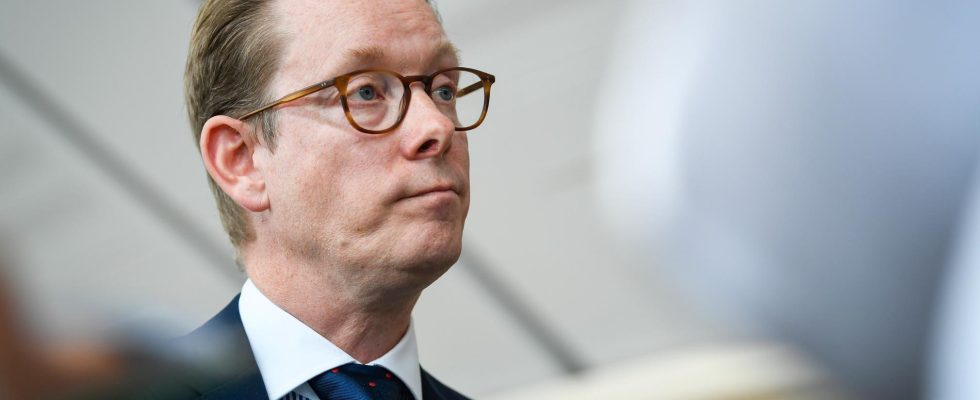Foreign Minister Tobias Billström (M) is traveling to the UN summit in New York with a main mission: Restore trust in Sweden in Muslim countries.
At the same time, he lacks a majority for the government’s plan to stop the Koran burnings.
Next week, world leaders will gather in the UN General Assembly in New York, and Prime Minister Ulf Kristersson and Foreign Minister Tobias Billström will participate from the Swedish side.
Climate change and security issues, including Russia’s war in Ukraine, are given topics.
But for the Swedish government, the UN week is more about two things: the Koran burnings and NATO.
– It contains a number of different possibilities for conversations with colleagues from different parts of the world, including the OIC countries. I look forward to having conversations on many occasions, says Tobias Billström.
The government distanced itself
The cooperation organization OIC, which includes 57 Muslim countries, has condemned the Koran burnings in Sweden and called on the member states to consider sanctions against Danish and Swedish interests.
The organization specifically wants the burning of the Koran to be brought up at the UN meeting.
Interest in what Sweden then responds to is great. Tobias Billström has a busy schedule with several so-called bilaterals, individual meetings, and interviews with major American media such as CNN, CBS, The New York Times and The Washington Post.
– Of course, we fully stand up for the constitutional freedoms that we have in Sweden. But the government has also been very clear that we distance ourselves from the acts that have been committed and see them as an expression of how individuals try to provoke and divide Muslims and non-Muslims, he says.
Great popular anger
There are several reasons for conducting dialogue with the OIC countries, not least because of the security situation, according to Billström. The popular anger in the Muslim world is genuine, while domestic political and state-backed actors, including Russia and Iran, are trying to take advantage of the events.
– What I see as most primary is of course to work to restore trust and the trust we need to have with the countries of this world, says the foreign minister and continues:
– So that we can get back to the normally very good relationship we have with these states. Some we have decades-long relationships with.
He does not want to name any specific countries he will have meetings with because talks can both pop up and be canceled at short notice.
One meeting that Billström wants to talk about, however, is with US Foreign Minister Antony Blinken. They will talk about Sweden’s entry into NATO, support for Ukraine and cyber issues.
To a direct question if he has anything planned with Iranian representatives, the answer is no.
The collaboration with SD
Billström will also take up the government’s investigation into reviewing the ordinance to be able to stop Koran burnings.
– I will touch on it in these bilaterals, because it is important to show the seriousness with which the Swedish government regards this development and the measures we are taking.
At the same time, the government currently lacks a majority for such a measure. The Sweden Democrats have said that they are in opposition to the government on the issue, S, V and MP are also skeptical.
– The discussion about possible majority relations in the Riksdag has been brought up too soon, we first need to see what the investigation’s final report will look like, says Billström.
TT: Do you feel that these countries somehow view the Swedish government negatively because you cooperate with a party, the Sweden Democrats, which is critical of Islam?
– No, it is not the case that these issues are raised in my discussions with foreign minister colleagues. Nobody out there is interested in the domestic political discussion in Sweden. Sometimes it is presented that way in the domestic political debate. What the Muslim world is upset about is that Korans are being burned in Sweden.
FAKTAFN’s high-level meeting
The UN’s high-level week in New York includes a series of meetings.
It is the 78th meeting of the General Assembly.
Among other things, discussions will take place on September 18–19 about Agenda 2030 regarding sustainable, global development.
On the UN’s website, a hope is described that discussions about a series of overlapping crises will rekindle “hope, optimism and enthusiasm”.
General debates are held 19–23 and 26 September. Overarching topics are peace, security and, in particular, sustainable development.
A debate will be held on 20 September on the financing of development projects against the background of an agreement from Addis Ababa in 2015.
UN Secretary-General António Guterres is also convening a climate summit on September 20, to increase pressure on countries and companies to do more.
On the same day, a high-level meeting is held on tackling and preparing for future pandemics.
On September 21, a meeting will be held on general health care.
On 22 September, a meeting will be held on the fight against tuberculosis.
Source: un.org
Read more
